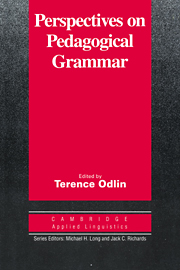Book contents
- Frontmatter
- Contents
- List of contributors
- Series editors' preface
- Preface
- Chapter 1 Introduction
- I WHAT SORT OF GRAMMAR?
- II GRAMMAR, LEXICON, AND DISCOURSE
- III PUTTING GRAMMAR TO WORK
- Chapter 9 The effect of systematic instruction on learning the English article system
- Chapter 10 Linguistic theory and pedagogic practice
- Chapter 11 The Introspective Hierarchy: A comparison of the intuitions of linguists, teachers, and learners
- Chapter 12 From printout to handout: Grammar and vocabulary teaching in the context of Data-driven Learning
- Chapter 13 Conclusion
- Glossary
- Index
Chapter 11 - The Introspective Hierarchy: A comparison of the intuitions of linguists, teachers, and learners
Published online by Cambridge University Press: 05 October 2012
- Frontmatter
- Contents
- List of contributors
- Series editors' preface
- Preface
- Chapter 1 Introduction
- I WHAT SORT OF GRAMMAR?
- II GRAMMAR, LEXICON, AND DISCOURSE
- III PUTTING GRAMMAR TO WORK
- Chapter 9 The effect of systematic instruction on learning the English article system
- Chapter 10 Linguistic theory and pedagogic practice
- Chapter 11 The Introspective Hierarchy: A comparison of the intuitions of linguists, teachers, and learners
- Chapter 12 From printout to handout: Grammar and vocabulary teaching in the context of Data-driven Learning
- Chapter 13 Conclusion
- Glossary
- Index
Summary
Both in the teaching and the learning of grammatical structures, intuition plays a key role. Teachers use their intuitions about the target language to provide goals for students and to evaluate student performance. Learners have their own intuitions about what does or does not belong to the target language, and changes in such intuitions reflect, however obliquely, their developing competence in the target language. This article considers the hierarchical nature of intuitions in language teaching. In idealized form, the hierarchy of intuitions establishes clearcut degrees of authority in judgments: Learners normally defer to the intuitions of teachers, and when teachers are in doubt they defer to the intuitions of grammarians (who may or may not be professional linguists). In reality, the workings of the hierarchy are far more complex. The focus of the article is on one of the problematic aspects of the hierarchy: the fact that there are limitations on the ability of teachers and linguists to provide reliable judgments. This fact has important consequences for everyday practice in language teaching.
On the nature of intuitions
Scholars have long found it difficult to define the term intuition in a fully adequate way. Such a definition would imply a satisfactory answer to some of the most intractable philosophical and psychological problems. The nature of knowledge, consciousness, and judgment will certainly be important considerations in any satisfactory account of intuition, but these and other considerations remain controversial (cf. Rorty 1967).
- Type
- Chapter
- Information
- Perspectives on Pedagogical Grammar , pp. 271 - 292Publisher: Cambridge University PressPrint publication year: 1994
- 4
- Cited by



